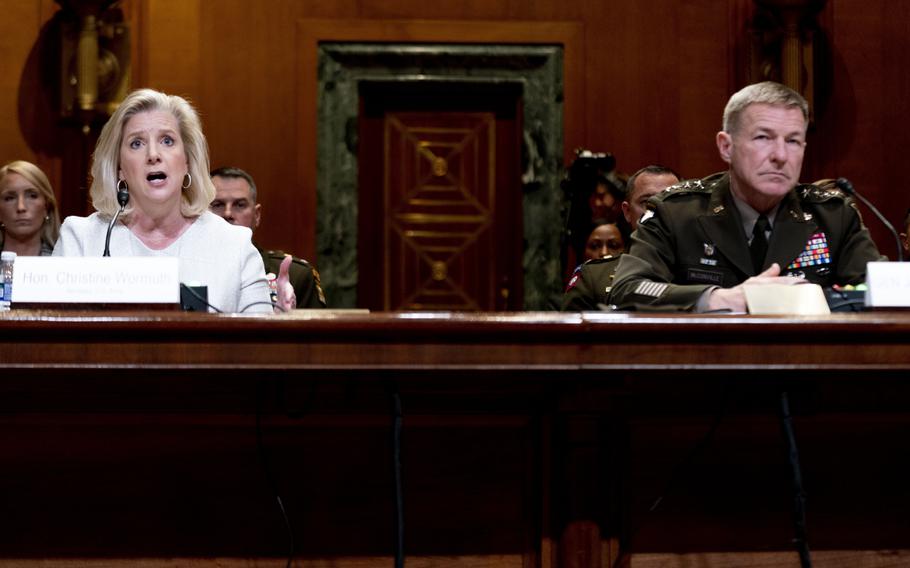
Secretary of the Army Christine Wormuth, left, accompanied by Army Chief of Staff Gen. James McConville, right, speaks Tuesday, May 2, 2023, on Capitol Hill in Washington during the Senate Appropriations Committee’s defense subpanel hearing about the Army’s proposed budget. (Andrew Harnik/AP)
The Army’s top officer expects all the service’s helicopters to return to flying in the coming days after he ordered an Army-wide aviation stand down Friday following two recent crashes that killed 12 soldiers.
Gen. James McConville, the Army chief of staff, told Senate appropriators Tuesday that he had directed aviation units to pause all operations for at least 24 hours this week to go over all procedures, from maintenance and safety protocols to training plans and basic flight mechanics. McConville, a career aviation officer who has flown most of the helicopters in the Army’s inventory, said he had instructed top commanders to use a “crawl, walk, run” mentality to tackle the stand down this week.
“Realize that this is a very dangerous business and unlike maybe operating a vehicle close to a curb, with aviation if you make a mistake or something happens it can be very catastrophic, and we need to bring that safety philosophy … back into the cockpits and make sure we're able to do that,” he told the Senate Appropriations Committee’s defense subpanel during a hearing on the Army’s proposed $185.5 billion fiscal 2024 budget. “I think it's going to be over in the next couple of days … and we're expecting immediate results.”
McConville ordered the grounding in the aftermath of a crash Thursday near Healy, Alaska, in which two AH-64 Apache attack helicopters collided in midair during a training mission. That crash — the second fatal collision of Army helicopters in about a month — killed Chief Warrant Officer 3 Christopher Robert Eramo, 39, of Oneonta, N.Y.; Chief Warrant Officer 2 Kyle McKenna, 28, of Colorado Springs, Colo., and Warrant Officer 1 Stewart Duane Wayment, 32, of North Logan, Utah. A fourth soldier, whose name has not been publicly released, was injured in the crash.
The prior crash on March 29 killed nine 101st Airborne Division soldiers when a pair of UH-60 Black Hawk helicopters collided during a night training mission near their home station at Fort Campbell, Ky. A third fatal helicopter crash this year occurred Feb. 15 near Huntsville, Ala. Two pilots with the Tennessee Army National Guard were killed in that Black Hawk crash.
Sen. Kirsten Gillibrand, D-N.Y., also sent a letter Tuesday to Defense Secretary Lloyd Austin calling for a Pentagon-wide probe of aviation mishaps in recent years. Gillibrand, a member of the Senate Armed Services Committee, wrote the Defense Department and Congress owe it to service members to ensure they can safely fly in helicopters.
She asked Austin to provide a response by Aug. 1 with any information the Pentagon has found identifying risks with specific helicopters or trends that could lead to improved safety.
“I take the responsibility we bear our service members very seriously,” she wrote in the letter. “Each year, we authorize funds for military budgets that prioritize certain aircraft over others. If we have known issues with certain helicopters, we need to know so we can resource your department in a manner that protects the lives of our brave women and men in uniform.”
Army Secretary Christine Wormuth, who testified alongside McConville, said she asked the general to issue the stand down order shortly after learning of the crash Thursday. She instructed him to ensure Army aviators would find “lessons learned from these recent incidents.”
Both recent crashes remain under investigation, Army officials have said.
Some senators on Tuesday questioned the readiness of the Army aviation community given the recent incidents.
Sen. Lisa Murkowski, R-Alaska, told the Army leaders that she hoped the stand down was “not just a messaging tool,” but that it resulted in real safety improvements for the force.
Sen. Jon Tester, D-Mont., chairman of the subpanel, noted aviation crashes since 2020 had cost the Army some $600 million in aircraft.
Wormuth told the senators that the 2024 budget proposal would fully fund pilot flight hours, as did the budgets passed during the last two fiscal years.
But she said Army aviation has faced other issues, including parts shortages and maintenance problems that can lead to grounding aircraft needed by units for training flights.
“I think one of the things that we need to look at is: Are our pilots actually getting enough flying hours?” Wormuth said. “To do that, we've got to make sure that the aircraft are ready to fly. And so there's sort of a lot of pieces that fit together in that, but we are definitely investing fully in that, in my view.”